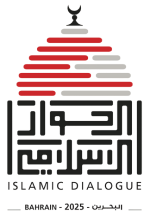At the close of the Intra-Islamic Dialogue Conference held in Manama, Bahrain, the conference issued its Final Statement titled “The Call of the People of Qiblah: One Ummah and One Shared Destiny.” The Statement begins by emphasizing that, “The foundation and essence of this call lie in the unity of the “Muslim Ummah,” which its Creator, Allah Almighty, has ordained as one nation. It emphasized that this unity is always the correct and steadfast starting point for fostering fraternity among Muslims. This fraternity extends beyond merely redefining their identities or fostering closer ties, focusing instead on understanding the requirements of their unity amid the challenges they face.”
The call acknowledges the existence of doctrinal differences and their underlying reasons, clarifying that the aim is not to eliminate such differences but to preserve Islamic fraternity, both scholarly and through media while affirming the legitimacy of doctrinal differences. This approach is based on the golden rule in the Islamic heritage: “We cooperate on matters we agree upon, and we excuse one another in matters of disagreement.”
‘The Call for Islamic Fraternity’ is designed to foster scholarly and doctrinal understanding, encourage the freedom of academic gatherings, and support these initiatives with all available resources, while remaining vigilant against any calls for division, conflict, and enmity. These are viewed as significant threats to the Ummah’s cohesion, unity, and integrity. The challenges and targeted aggressions faced by Muslims represent a collective threat that aims to disrupt their unity and impede their progress.
The Statement stated that the Holy Quran is the eternal guiding scripture of the Ummah, and Prophet Muhammad (PBUH) is the final messenger and seal of the prophets. They are the sources of the religion of Islam, the wellspring of its belief, the guiding light of our vision, and the cornerstone of the historical mission of faith. It further affirmed the legitimacy of differences in understanding, opinion, and stance. Diversity is a divine decree, a natural human condition, and a fundamental historical and social reality— one from which Muslims are no exception.
The call highlighted that freedom is the basis of responsibility and the core of accountability. Allah has granted human beings freedom of thought and action, making it the foundation of their accountability and their entrusted responsibility. If the Quran guarantees freedom of choice in faith, as stated: “And say, ‘The truth is from your Lord, so whoever wills—let him believe; and whoever wills—let him disbelieve’” (The Quran, 18: 29), then the right to choose one’s school of thought and religious approach is even more fundamental and undeniable.
The call also pointed out that mutual respect among the leaders of the religious schools of thought and their followers is mandated by religious law and is now unanimously agreed upon by this inclusive call, by the will of God. It affirms that “all Muslims are as ourselves.” As Allah Almighty says: “Then greet one another with peace” (The Quran, 24: 61). Every Muslim is an integral part of the unified body of the Ummah, a fundamental component of its fabric, encompassing all its schools of thought and Islamic traditions.
The call urged an immediate and necessary cessation of insulting the figures of any religious sect or causing harm to them, as well as any form of disrespect towards a Muslim due to their sect or opinions. It warned against the stances and speeches of some preachers and orators who lack sufficient knowledge of the conditions and realities of their Ummah. Such rhetoric fosters hatred among Muslims and deepens divisions, posing a threat to the cohesion, safety, and harmony of the unified Ummah, both now and in the future.
‘The Call for Islamic Fraternity’ emphasized that achieving its goals, particularly in truly restoring the spirit of one united Ummah, requires a reminder of several overarching principles, governing values, and necessary actions. These are called for earnestly and with urgency, among which the most notable is that the unity of the Muslim Ummah is a sacred covenant and a protected charter.
The Call emphasized that mutual understanding and cooperation in fulfilling the requirements of the Islamic fraternity are imperative duties for all Muslims. The Islamic dialogue required today, which the Ummah needs, is not merely a doctrinal or approximative discussion, but rather a constructive dialogue of understanding that encompasses the many elements of unity in facing shared challenges. This includes adhering to the etiquette and ethics of dialogue. Moreover, the renewal of Islamic discourse is essential to dispel strife and isolate extremist voices in every sect.
The call urged religious, scholarly, intellectual, and media institutions to cooperatively address the culture of hatred and resentment among Muslims as a critical duty. It emphasized the importance of wisdom and courage in self-criticism of certain traditional intellectual and cultural claims, acknowledging that the intellectual heritage of all Muslim schools is not without its interpretive errors that should be reassessed and addressed.
It highlighted that guiding scholars, intellectual elites, and opinion-makers towards mutual understanding is the most effective way to shift public opinion among Muslim masses in the same direction. Major Islamic academic institutions are called upon to undertake a comprehensive scholarly project that documents all areas of agreement among Muslims in creed, Sharia, and values. This project will significantly enhance the Ummah’s self-awareness, correct misconceptions within its community, foster a shared Islamic culture and strengthen its humanitarian mission.
Furthermore, the call stressed the utmost necessity to safeguard the Islamic message and discourse from the influences of political disagreements and their pressures, which sometimes lead to the distortion of religious values and rulings for short-term partisan gains. In this context, the press and media, especially social platforms, bear a great responsibility and a significant duty to move beyond conflict-ridden discourse among Muslims, avoiding the instigation of its causes and impulses.



